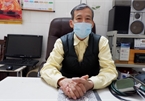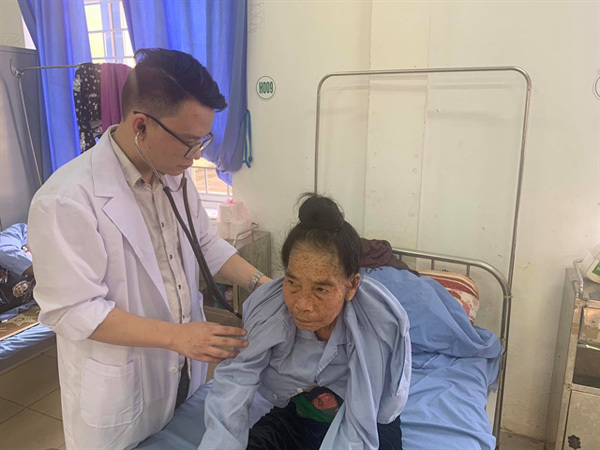|
||
| Doctor Tran Huu Canh examines a woman at Quynh Nhai District General Hospital, Son La Province. |
Lo Thi Son, 27, a resident from Nậm Ét Commune, Quynh Nhai District, said her health had been much better after successful surgery for appendicitis at the district's General Hospital.
She said young doctor Tran Huu Canh, who has volunteered to work at the hospital for more than a year, had saved her life and she was very happy she didn't have to go to the provincial hospital or central-level hospitals for treatment.
Pham Van Tac, director of the Department of Science, Technology and Training under the Ministry of Health, said Canh had developed his skills while working in the locality.
"The contribution of young doctors at district-level hospitals in many provinces has brought remarkable results in public health care systems in localities, especially in the time of fighting the COVID-19 pandemic," said Pham Van Tac, director of the Department of Science, Technology and Training, Ministry of Health.
"This shows that the local public medical facilities can still be fully active in disease prevention and treatment if they have enough human resources and on-site equipment," Tac told vietnamplus.vn.
Working at Quynh Nhai District General Hospital since January 2019, Canh has applied many new techniques in the hospital's examinations and treatments.
He has also participated in the diagnosis and treatment of serious cases in the intensive care units of emergency, internal medicine, paediatrics, obstetrics and infectious diseases.
Canh, from the National K (Cancer) Hospital, was among the seven doctors, part of a pilot project to send young doctors to poor districts.
Doctor La Thi Yeu, director of Quynh Nhai District General Hospital, said the hospital's medical examination and treatment work had improved a lot since receiving young doctors.
According to director of the provincial Department of Health Nguyen Thi Kim An, 80 per cent of commune-level health facilities have doctors but the infrastructure and skills of doctors in many localities are still limited.
Under the pilot project, 26 young doctors will be sent to the province's health care facilities.
Four of them are working at general hospitals in Quynh Nhai and Sop Cop districts.
An proposed the project should continue to train more doctors to help improve health examination and treatment quality in localities.
Reports from health departments in poor districts showed 63 districts needed about 600 doctors for 15 different specialities.
The project was implemented by the Ministry of Health in February 2013 with the goal of ensuring the sustainability of high-quality health human resources.
About 300 to 500 young doctors are expected to be sent to work in poor areas this year.
Doctor Tac said so far 354 young doctors at Hanoi Medical University, University of Medicine and Pharmacy, Hue University and University of Medicine and Pharmacy, Hai Phong University, had been trained under the project, helping the poor and people living in remote areas access quality health services.
It also contributed to reducing overloads in higher-level hospitals, avoiding waste for people and society, Tac said. VNS

Retired nurses and doctors volunteer to return to serve
Hundreds of retired doctors and nurses in Hanoi have decided to return to work amid the rising number of Covid-19 patients in the country.
 Young doctors who volunteer to work at district-level health facilities in provinces across the country have made significant changes to the public health care sector.
Young doctors who volunteer to work at district-level health facilities in provinces across the country have made significant changes to the public health care sector.